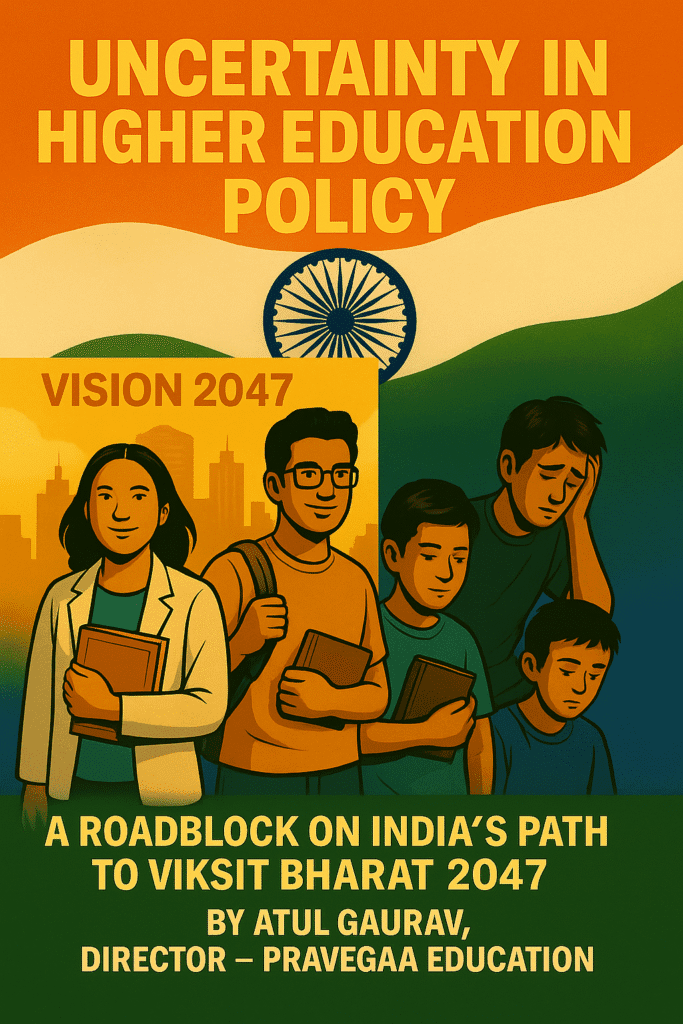Uncertainty in Higher Education Policy: A Roadblock on India’s Path to Viksit Bharat 2047 By Atul Gaurav, Director – Pravegaa Education

India’s ambitious goal of becoming a developed nation by 2047—Viksit Bharat—is a vision grounded in hope, strategy, and innovation. Our nation is already making great strides in infrastructure, digital services, and start-up culture. However, one critical pillar remains worryingly underdeveloped: a coherent and well-funded higher education and research policy.
Despite producing world-class minds, India’s academic infrastructure is facing growing uncertainty. If we are serious about Viksit Bharat, we must confront and address these gaps head-on.
- Alarming Underinvestment in Higher Education and R&D
Let’s begin with hard numbers.
According to OECD and UNESCO (2024):
- India’s spending on higher education stands at just 0.8% of GDP, while the USA spends 2.5%and China 1.7%.
- On research and development (R&D), India allocates only 0.64% of GDP, in comparison to 4% by China and 3.4% by the United States.
This underinvestment is a structural bottleneck. Without significant funding, we cannot modernize labs, build cutting-edge institutions, support faculty development, or retain top research talent. The Ministry of Finance and Ministry of Education must urgently raise public spending to match our developmental ambition.
- Confused Higher Education Policies and Unclear Role of NET
The National Education Policy (NEP) 2020 introduced a 4-year undergraduate program aimed at flexibility and research readiness. Yet its rollout has created confusion:
- No standardized syllabus for the 4th year exists in most universities.
- There’s no clarity on equivalence between 4-year UG and 3+2 PG routes.
- PhD admissions and competitive fellowships do not consistently recognize the fourth year’s research value.
This disjointed implementation leaves students in limbo—unsure about how their academic path aligns with their future goals.
Adding to the confusion is the uncertain role of NET and other competitive exams:
- Will the 4-year UG program replace or bypass the need for NET/CSIR NET for research or teaching?
- If NET remains mandatory, why isn’t its syllabus aligned with the NEP’s proposed academic structure?
We need an immediate policy clarification, ensuring consistency between curriculum reforms and examination frameworks to avoid risking the academic future of millions.
- Repeated Failures of NTA and UGC to Conduct National Exams Timely
Examinations like CSIR NET, UGC NET, CUET, and others are not just evaluation tools—they’re lifelines for students aiming for academic, research, and teaching careers.
Yet in recent years:
- NTA has repeatedly failed to conduct exams on schedule.
- Exams have been postponed or canceled abruptly, affecting preparation, motivation, and mental health of aspirants.
These failures indicate a deep institutional breakdown. For India to produce world-class educators and scientists, we need a robust, technology-driven examination mechanism, managed with transparency and accountability.
- Uncertain Futures Even After Qualifying Prestigious Exams like NET and GATE
India’s academic excellence is deeply rooted in rigorous national-level competitive exams like CSIR NET, UGC NET, and GATE.
These exams:
- Identify India’s most talented individuals for research fellowships, teaching positions, and postgraduate programs.
- Are essential in maintaining academic meritocracy, especially for students from small towns, rural areas, and modest backgrounds.
But despite qualifying:
- Thousands of scholars are left without jobs or research opportunities.
- Faculty hiring is frozen or indefinitely delayed.
- Many are forced into underemployment or leave academia altogether.
This is not the fault of the exams. In fact, their relevance has never been more critical. What’s missing is an ecosystem that values, absorbs, and supports these qualified minds.
Rather than diluting their importance, India must double down on the integrity of NET and GATE, and build clear post-exam pathways that reward achievement with opportunity.
- Foreign Universities May Widen Inequality in Indian Education
The push to allow foreign universities to set up campuses in India may look progressive on paper—but it risks creating a new layer of elitism.
Here’s the reality:
- Most Indian researchers, professors, and PhD scholars come from the middle class, having earned their place through exams like GATE, IIT JAM, CUET, CSIR NET, and UGC NET.
- These students depend on public universities, scholarships, and affordable education to advance their careers.
Foreign university campuses, likely to charge premium fees, will be accessible mostly to those from affluent families, creating a two-tier education system.
Rather than importing institutions for the wealthy, the government should:
- Invest in upgrading Indian universities.
- Improve research infrastructure.
- Ensure equal opportunity for all, based on merit—not money.
Until then, the foreign university model will only serve a small elite, while leaving the real engine of India’s intellectual growth behind.
- No Aggressive Policy to Link Industry and Academic Research
In most developed nations:
- Industries fund research at universities.
- Faculty and students collaborate on Real-world problems.
- Innovations move seamlessly from lab to market.
In India:
- Industry-academia linkage is weak or absent.
- Research remains paper-driven, not problem-driven.
- Students graduate without exposure to applied innovation.
We urgently need a national platform that connects educational institutions to industrial R&D units, especially in sectors like energy, AI, materials science, and biotechnology. A National Industry-Academia Fellowship Program could catalyze this synergy.